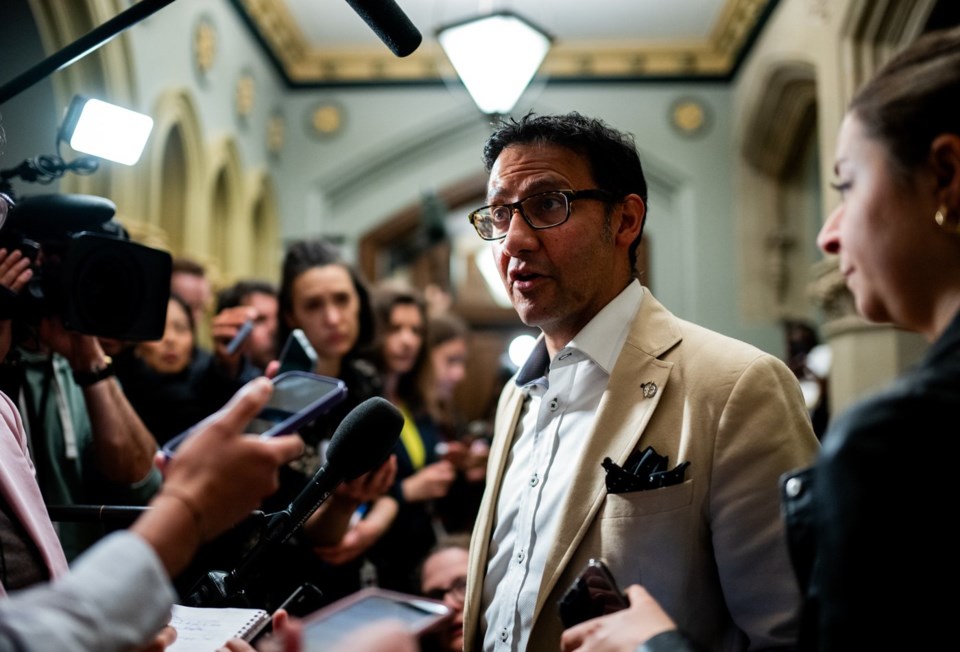OTTAWA — The Liberals know it will "take some time" to create a new regulator to compel internet giants to take steps to better Canadians against online harms, Canada's justice minister said Tuesday.
Arif Virani's comments come as the Opposition Conservatives are criticizing the government's plan to create a new regulatory scheme through its Online Harms Act as nothing more than an onerous bureaucracy that won't be ready before the next election.
The bill seeks to establish a new Digital Safety Commission of Canada, which would have the power to levy fines and evaluate companies' digital safety plans.
It also proposes hiring an ombudsperson to hear Canadians' concerns, which the government says would be supported by a new Digital Safety Office. The bill itself targets seven categories of what the government considers to be the most dangerous and egregious online behaviour, from the non-consensual sharing of intimate images to content that can be used to bully a child.
"We know that establishing a new commission … and an ombudsperson will take some time," Virani said Tuesday on his way into the weekly cabinet meeting.
The minister was responding to a question about whether those bodies could be in place before the next federal election, which is scheduled to happen by October 2025.
During debate on the bill last week, Conservative MP Michelle Rempel Garner had raised concerns about the timeline, saying she believed "the regulatory process is not going to happen prior to the next election."
"Even if the bill is rammed through," she told the House of Commons last Friday.
Rempel Garner also said she has asked the Parliamentary Budget Officer to analyze how much setting up those entities will cost.
In response to the concerns, Virani said the government has always known that creating a new regulatory body is going to take some time.
"It's obvious," he added.
Experts who consulted with the government on an online harms regime signed an open letter last fall calling on legislation to be tabled after repeated promises from the Liberals.
The letter warned that children in Canada had fewer protections than their counterparts in places like the United Kingdom and Australia, which regulate platforms for the content they host.
Bernie Farber, the former chair of the Canadian Anti-Hate Network who was part of those consultations, said efforts to tackle the growth of hate in Canada have been delayed for years. He is concerned about the fate of the long-promised piece of government legislation.
"Find a way to make it work," he said in an interview Tuesday. "It's time."
When Virani tabled the bill earlier this year, he defended the amount of time it took, saying it was necessary to strike the right balance between protecting Canadians from harm while upholding the right to free expression.
Prime Minister Justin Trudeau first promised such legislation during the 2019 election campaign but there have been several delays.
After their first attempt at bill was introduced in 2021, experts raised the alarm about a proposal to force social-media companies to take down content within 24 hours of a complaint, warning that could lead to platforms removing legal content and violating free expression.
Those criticisms sent the Liberals back to the drawing board.
The issue picked up steam last October as police, along with Jewish and Muslim advocacy groups, reported a sharp increase in violent incidents and hateful rhetoric online in the wake of the Israel-Hamas war.
Virani said Tuesday there are "different components" of the legislation.
He noted that certain parts of the bill, like changes to the Criminal Code and the Canadian Human Rights Act, would take effect "much more quickly" after the bill's passage.
Those changes "target the specific amounts of division and hatred that we're seeing in Canadian society," he said.
Advocates and some legal experts, however, are critical of those measures, which include stiffer penalties for hate-related offences, saying the changes risk chilling free speech.
They are raising similar concerns about a proposed change to human-rights law that would allow Canadians to bring forward complaints about hate speech, saying it could lead to an influx of unfounded or malicious complaints.
This report by The Canadian Press was first published June 11, 2024.
Stephanie Taylor, The Canadian Press

